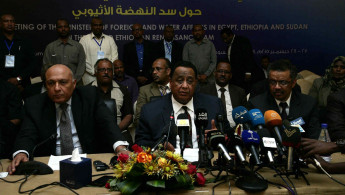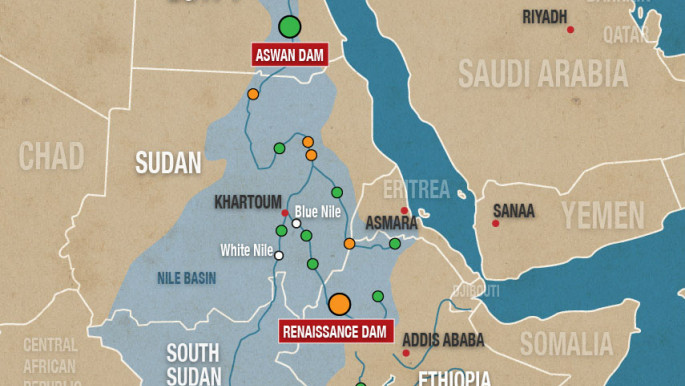Egypt, Sudan and Ethiopia FMs talk Nile dam impasse
Egyptian Foreign Minister Sameh Shoukry arrived on Wednesday in Sudan for a two-day visit to discuss a massive dam that Egypt fears will cut into its share of the Nile.
The meeting is being attended by chiefs of intelligence and ministers of foreign affairs and irrigation in Egypt, Sudan and Ethiopia.
The meeting will attempt to settle contentious issues over the so-called Renaissance Dam that Ethiopia is building over the Blue Nile River, according to Egyptian foreign ministry spokesman Ahmed Abu Zeid.
The meeting was scheduled in February but delayed amid anti-government protests in Ethiopia.
Nearly all of Egypt's freshwater comes from the Nile, with 100 million Egyptians depending on it for their water needs. Egypt says it has "historic rights" to the river, guaranteed by treaties from 1929 and 1959, and has expressed mounting alarm over the soon-to-be-completed upstream dam.
The Nile begins in Ethiopia and Burundi as the Blue Nile and White Nile, respectively. The two join together at Khartoum, Sudan's capital, with the former supplying 90 per cent of the river's total volume of water.
|
Tensions had risen in recent months when Sudan appeared to take Ethiopia's side in the dam negotiations and revived a longstanding border dispute with Egypt.
Ethiopia has vowed to go ahead with the dam despite Egypt's concerns, saying it is vital for the east African country’s development.
Unlike Egypt, Ethiopia receives plenty of rain and does not depend on the Nile as a water source.
Ethiopia's Grand Renaissance Dam project on the Blue Nile, launched in 2011, is designed to feed a hydroelectric project to produce 6,000 megawatts of power, equal to six nuclear-powered plants.
Some observers say there is a risk that Egypt could launch a military campaign in Ethiopia. The Egyptian naval fleet is already cruising in the nearby straits of Bab al-Mandab, where Cairo is an actor in the Yemen war.
Egyptian forces have also been deployed to Eritrea, Ethiopia's rival with whom it fought a war from 1998 to 2000.
Despite Egypt's military edge, a military campaign could be costly and isolate Cairo diplomatically.
Follow us on Twitter: @The_NewArab






 Follow the Middle East's top stories in English at The New Arab on Google News
Follow the Middle East's top stories in English at The New Arab on Google News

![Israeli forces ordered bombed Gaza's Jabalia, ordering residents to leave [Getty]](/sites/default/files/styles/image_330x185/public/2176418030.jpeg?h=a5f2f23a&itok=_YGZaP1z)
